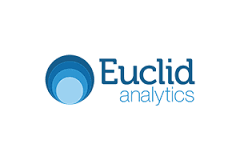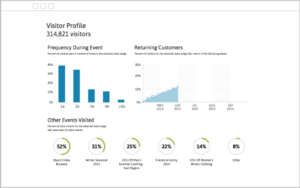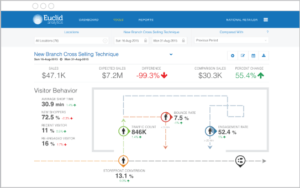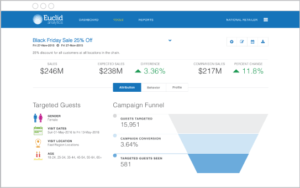We know you looked at that ugly sweater: Euclid Analytics, in-store tracking and the narrowing of the online-offline gap

Your smartphone's WiFi is being used to track you
72% of Americans now own a smartphone [1]. As smartphones have become increasingly prevalent, they have revolutionized how businesses market to consumers. While the implications for e-commerce have been clear, smartphones also stand to change brick-and-mortar retailing, in part through increasingly granular in-store tracking.
Enter Euclid Analytics. Euclid’s core software product is installed on a retailer’s WiFi network [2] and tracks smartphone Wi-Fi signals in-store to provide retailers an unprecedented level of granularity in measuring customer behavior in brick and mortar stores, including shopper volumes, the percentage of passersby who enter, and browsing patterns and stay duration, regardless of whether the customer connected to instore WiFi or not. Euclid identifies a smartphone by its Media Access Control address, which until the advent of iOS 8 was static for a given device [3], allowing Euclid to uniquely identify shoppers between visits and across stores. Euclid then synthesizes this data into dashboards, allowing retailers to visualize store flows, track shopper volumes and measure the effectiveness of different store layouts, as well as integrating with common CRM, Marketing and POS systems. See below for dashboard samples
Most recently, Euclid introduced Euclid Connect in July 2016, a white-labeled technology solution whereby retailers can allow customers to opt-in to store WiFi with a single login [4][5]. This allows retailers to link online behavior to in-store activity, closing the online-offline gap and creating an omnichannel tracking system where retailers can attribute in-store behavior to existing online campaigns.
Euclid was founded in 2010 and has grown since then, raising $44M in venture capital including a $20M series C in January 2016. The company claims that is used by 500 clients in over 65 countries and captures 7 billion data points a day [6]. This growth has likely been aided by platform’s ease of installation. Since Euclid relies on Wi-Fi and integrates with existing networking providers, the company claims that its system can be deployed in 48 hours [7]
Privacy concerns and the emerging ethical dilemma
The arrival of this kind of technology also raises deep-seated concerns that apply to the broader digital movement, namely the expectation of privacy and the control that users have over their data.
Euclid is not the first company to introduce this kind of in-store tracking service, but the nature of its technology means that it operates without requiring users to consent to being tracked, unlike competitors such as Apple’s iBeacon. While Euclid admittedly anonymizes their data, and allows users to have their information deleted from Euclid’s systems [8], this may not be good enough. According to a 2015 Pew Survey, 88% of Americans considered it important that someone not be able to track them without their permission [9], and a recent survey by OpinionLab found that 77% of customers find in-store tracking unacceptable [10]
The signs of potential privacy-focused backlash among retailers are already apparent, with Philz Coffee terminating its contract with Euclid due to customer complaints about privacy [11]. While customers have certainly looked past the privacy concerns that accompany the digital era before, Euclid’s ability to overcome these issues on its path to sustainability is an open question.
The path forward – creating a robust solution without compromising privacy
As of right now, I think there is considerable room for Euclid to continue to grow and expand its offering. Some things it might consider include:
- Developing custom hardware to enhance its level of fine-grained control
- While the ease of installation is a selling point, the continued proliferation of sensors allows unique opportunity to expand Euclid’s functionality
- For example, by embedding sensors in displays, Euclid could measure how often people touch given sets of merchandise, and how strongly that correlates with a purchase decision
- Expanding into services
- While Euclid has started to generate consumer research and white papers [12], its technology offers it a differentiated edge as a retail advisor, providing consulting and ad-hoc development and analytics support surrounding Euclid’s API to ensure that retailers get the most value from the service
- Given that, in a 2014 survey of the top 200 retailers 71% said they performed basic or no analytics or reporting [13], this could be highly value additive as retailers build out their analytics strategy to compete with e-commerce
Most importantly however, Euclid must encourage its retail partners to take a stand on privacy. This could take many forms, including providing customers with ways to opt-out of in-store tracking in online communications / receipts, increasing data security, or tightening limits on how long data can be stored. While this could hamstring the effectiveness of the offering, customers have been clear about their hesitance toward in-store tracking and their concerns must be addressed. As digital technology allows marketers to more closely marry the online and physical worlds, these privacy questions will become increasingly important.
Word Count (798)
Sources:
[1] Pew Research. “Smartphone ownership continues to climb in emerging markets” http://www.pewglobal.org/2016/02/22/smartphone-ownership-and-internet-usage-continues-to-climb-in-emerging-economies/. Accessed 11/15/16
[2] Euclid Analytics Insight Product Page: http://euclidanalytics.com/product/euclid-insight/. Accessed 11/15/16
[3] Bloomberg. “Apple cuts off a way to secretly track shoppers” http://www.bloomberg.com/news/articles/2014-06-10/apple-cuts-off-a-way-to-secretly-track-shoppers. Accessed 11/15/16
[4] http://www.martechadvisor.com/news/ecommerce/euclid-analytics-redesigns-instore-wifi-experience-with-euclid-connect/. Accessed 11/15/16
[5] Euclid Analytics Connect Product Page: http://euclidanalytics.com/product/euclid-connect/. Accessed 11/15/16
[6] Techcrunch “Euclid Analytics Raises $20M to track consumer behavior in retail store” https://techcrunch.com/2016/01/14/euclid-analytics-raises-20m-series-c-to-track-consumer-behavior-in-retail-stores/. Accessed 11/15/16
[7] http://www.marketwired.com/press-release/new-study-from-euclid-analytics-ekn-research-finds-wi-fis-role-is-expanding-stores-2094765.htm. Accessed 11/15/16
[8] Euclid Analytics Privacy Statement: http://euclidanalytics.com/about/privacy-statement/. Accessed 11/15/16
[9] Pew Research “American Attitudes about Privacy, Security and Surveillance” http://www.pewinternet.org/2015/05/20/americans-attitudes-about-privacy-security-and-surveillance/. Accessed 11/15/16
[10] Fortune “Consumers hate instore tracking but retailers startups and investors love it” http://fortune.com/2014/03/24/consumers-hate-in-store-tracking-but-retailers-startups-and-investors-love-it/. Accessed 11/15/16
[11] Techcrunch “Philz Coffee drops Euclid Analytics over privacy concerns“ https://techcrunch.com/2014/05/29/philz-coffee-drops-euclid-analytics-over-privacy-concerns/. Accessed 11/15/16
[12] http://euclidanalytics.com/resource/type/research/. Accessed 11/15/16
[13] Euclid Analytics, “Unlocking the Business Potential of the Of ine World Through Wi-Fi Location Analytics”. Accessible at http://go.euclidanalytics.com/unlocking-business-potential. Accessed 11/15/16






The first reaction after I read the first half of this article is privacy concerns. Personally I don’t mind being tracked in a department store but I guess that many people do not hold the same opinion. Especially Euclid is able to track the customers no matter whether they are connected to WIFI or not. If customers feel that they will lose privacy once they step into the store, they will be less likely to shop in that place I suppose. Therefore, even though it is tempting to generate data about customer behaviors, a shop must be very careful when thinking about using Euclid.
This post mentions that the MAC addresses of smartphones were static until the advent of iOS 8. I wonder how Euclid’s product functionality is affected by the MAC addresses becoming dynamic instead. It would become seemingly impossible to track a specific user across multiple visits, and their value proposition could be compromised.
One way to get around this is to introduce a new opt-in method, which then uniquely identifies users with some other ID. However, adoption would be inevitably far lower.
To echo some of the other replies here, this is one of those really tricky areas where the value to the businesses who use Euclid is very clear, but the value to the customers who are being tracked is completely unclear. It is one thing if people are giving up some of their privacy in return for a greater benefit – the classic example being those individuals who are comfortable with the government gathering phone and email data with the purpose of enhancing national security and safety for all. However, in this case consumers are being very closely tracked – largely without their awareness – for the purposes of providing data to companies that will ultimately be used to squeeze more money out of the consumer and enhance the profitability of the store. I don’t know many people who would opt-in to being tracked if the ultimate outcome is to exploit themselves. I am also not sure that with all of the cyber warfare that goes on today that Euclid asserting that they “anonymize” the data does enough to ensure that consumers information is protected. I think in the long run Euclid is going to need to seriously consider how they can provide a true benefit to the end consumer if people are to agree to be tracked by their software.
Sam, this made for a great read – thank you! I liked your idea about embedding sensors in the racks, which allows for a level of consumer anonymity. While expanding into hardware solutions doesn’t fit with their current business plan (i.e. their big selling point to retailers is low capex / software only as I understand it), in addition to additional earnings this diversification allows them to mitigate the software’s commercial risk associated with consumer privacy. As said risk is either mitigated by consumer habit or clarified legislatively, they would be well placed to provide much more comprehensive solutions to their customers.